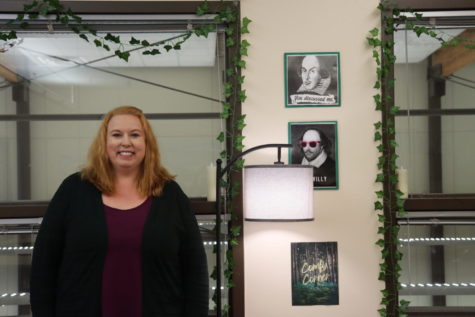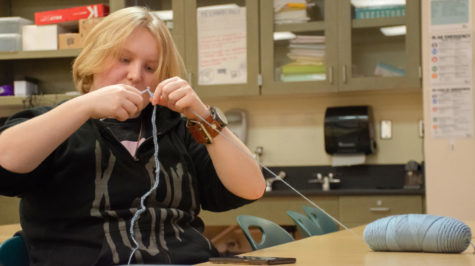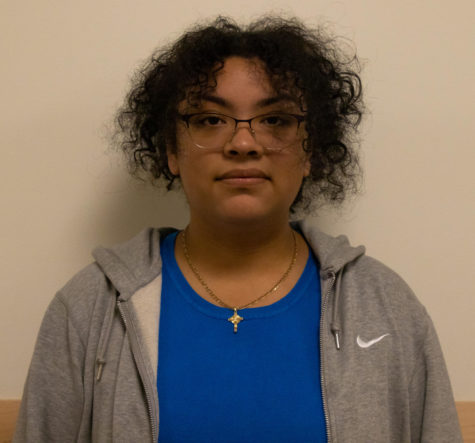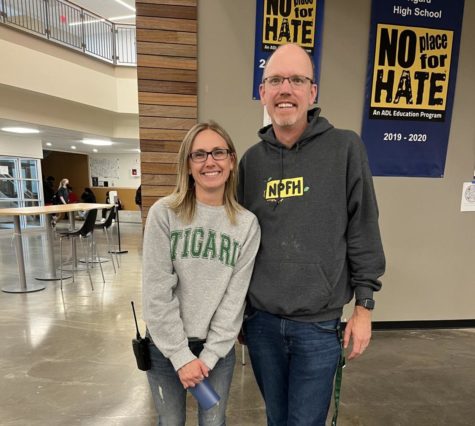Climate Club taking action to make change
Climate Club has ambitious goals for its first year at Tigard High
Jessica Woolfolk (12) is president of Climate Club and Dryden Raschdorf (11) is one of the club’s officers. Climate Club hopes to instill a recycling and composting program within the school this year.
November 1, 2019
Among many clubs new to the Tigard High scene this year is Climate Club, a service-based group dedicated to climate-focused activism. The club’s officers have been busy forming their “plan of action” since meetings began last month.
Junior Dryden Raschdorf, one of the club’s activist committee officers, believes environmentalism should be a bipartisan philosophy and that working to protect the planet is critical to ensure a sustainable future.
“We should all be caring about the planet,” he said. “It’s what we live on.” Raschdorf is confident that by getting the whole student body involved, Climate Club can reduce the stigma that environmental advocacy is a perspective exclusively held by liberals.
Senior Jessica Woolfolk started Climate Club this year hoping to build a foundation that will leave an impact long after she graduates.
“The fact that we didn’t already have anything set in place [at school] for such a pressing issue was a little off putting,” Woolfolk said. “I thought that even though it’s my senior year I should at least get something started that people can take over.” However, she acknowledges that real change is not something that can be done in a year.
“This is not an issue that we can completely resolve in one year’s time, and since I’m graduating this year I’m going to have to entrust that some of my younger officers and members of the club are going to take this on,” Woolfolk said. Her focus this year is simply getting everyone on board, including students and administration, to make climate-conscious decisions.
“If we can get that mindset embedded in everyone, I feel like that is ultimate progress,” she said. Once enough people are aligned with the club’s goals, she says, Climate Club can take real initiative to enact change within the community.
Senior Alaa Elamin, another of the club’s activist officers, believes Climate Club may face initial difficulties before they are fully up and running this year.
“It’s hard when you’re a new club and you have to come up with all the ideas,” Elamin said. “It’s much harder than it is in NHS or Key Club when you have everything already laid out for you.” Building that platform, she says, is a crucial first step to making students’ voices heard.
Woolfolk believes the ongoing school remodel provides the perfect opportunity to push for social change in the school as well, especially with regard to the new courtyard set to be completed next year. “As we’re building a new school, I think to build it with a focus on climate and climate education is important,” Woolfolk said. She wants to attend the Student Success Act meetings and pitch for the grant money to be used to promote environmental health in schools.
“If I were able to, I’d implement some form of not only environmental education embedded in a required science curriculum, but some form of environmental conscience as well,” Woolfolk said. Her hope is that the new courtyard could be a useful factor in reaching this goal. One of the club’s first plans of action is to call for a composting area in the courtyard as well as extra recycling bins to be placed around the school.
“We’re planning on making a petition and getting a good amount of the student population to sign it,” Elamin said. The club is also looking to raise money through reusable straw or Hydro Flask sales; the funds would go toward supporting club projects like beach cleanups or charity events.
Ecology teacher Holly Paris aims to gain funding from the Parent Support Organization to help leverage the club, but she wants to take a back seat while she lets the students take charge of the movement.
“I will definitely support anything [the club] wants to do, but I feel like students have better and bigger voices than I do,” Paris said. “It’s not that they don’t care about teachers; it’s just that we’re here to support the students, and if the students’ voices are loud enough, [the administration] is going to listen.” Woolfolk is even considering the possibility of giving Spirit app points to students who attend Climate Club events to further encourage the student body to support their cause.
“People want to get points on the Spirit app and get the badges and[…] if we can partner with that, it wouldn’t be too hard,” Woolfolk said. “You’re saving the Earth and getting Spirit points.” The Spirit app, according to Woolfolk, is one example of a much-needed incentive to inspire pro-environment action.
“People care about it when they hear about it and believe that it’s real, but no one ever wants to really go further than just talking about it,” Woolfolk said. “[A lot of] people are always all bark, no bite.” Most of all, she added, she hopes the school board may keep an open mind at the possibility of spending more money to invest in certain areas related to environmental health.
“I think people just don’t really want to push forward because it’s going to change what we already have in place,” Woolfolk said. “I feel like people fear change, especially in an environment where it would affect two thousand students and teachers.” While she admits it won’t be entirely free, the payoff will be worth it in her eyes. Elamin shares Woolfolk’s passion for inspiring others to take action.
“I’m trying to get people to care,” Elamin said. “A lot of us are into the idea of recycling and saving the planet, but it’s about making the time for it and prioritizing it to everyone.” Raschdorf also feels dissatisfied with the lack of initiative being taken, but he claims the spread of misinformation online is to blame.
“Information tends to get warped with what’s being projected on social media, so my goal is to project actual information,” Raschdorf said. He says some matters like global temperature are largely overexaggerated in political debate while other issues, like the continued use of microplastics, aren’t getting nearly enough attention.
All in all, Woolfolk’s goal for the club is to lay a foundation that allows it to evolve into a schoolwide movement. “I think knowledge is power, and proper education of the severity of the issues that we’re facing [is necessary],” she said. “I’m trying to make this as accessible for everyone as possible, even if they can’t join the club.”
Climate Club meets every other Thursday morning in Room 330. Their next meeting is on Nov. 14. Students unable to attend the meetings can still keep up to date on polls and important announcements by following the club’s Instagram profile (@ths_climateclub) and joining the Google Classroom (the code to join is ucuwv2).

















